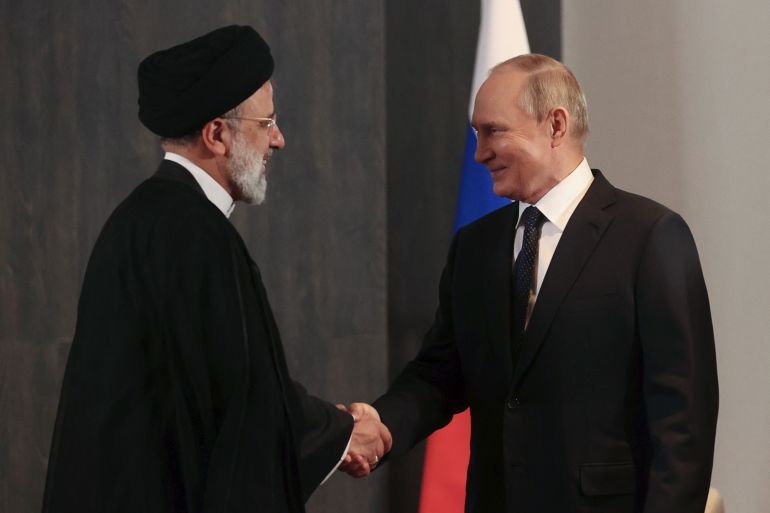Putin, Raisi discuss deepening ties between Russia and Iran
The two leaders are strengthening ties as they face increasing discontent at home and isolation from the West.

Russian President Vladimir Putin and his Iranian counterpart, President Ebrahim Raisi, have discussed deepening political, trade and economic cooperation in a phone call on Saturday, their governments said in separate statements.
The two leaders “touched upon some pressing bilateral issues with a focus on how to build up cooperation in the political, trade and economic areas, including in the field of transport and logistics”, the Kremlin said.
Keep reading
list of 3 itemsIran’s embattled currency plunges to historic lows amid protests
Iran denounces skater who flouted hijab rule abroad amid protests
“They agreed that the corresponding Russian and Iranian institutions will increase contact,” the statement added.
The Iranian Presidency said Raisi welcomed “Russia’s desire to strengthen economic cooperation with the Islamic Republic”, especially the development of transport lines in the Eurasian region.
“This transit route will become an attractive route for the economy and trade in the world,” Raisi was quoted as saying.
The statement added that Putin had expressed sympathy for the government and the people of Iran for the attack on a Shia religious shrine in the southern Iranian city of Shiraz, which killed 15 people and injured 40 others.
Putin “condemned terrorism in any form”, it said.
The call comes on the heels of a meeting between senior Russian security official Nikolai Patrushev and Iran’s top security official Ali Shamkhani in Tehran on Wednesday, in which they discussed the situation in Ukraine and measures to combat what they called “Western interference” in their internal affairs, according to Russian state media.
Iran has faced backlash in recent weeks after Ukraine accused Russia of using Iranian-made “kamikaze” drones in attacks on cities and energy infrastructure in recent weeks.
Iran said last week it had sold the unmanned vehicles to Russia “months” before the start of the war in Ukraine.
Iranian officials said on numerous occasions that Tehran had “defence” cooperation with Russia, but had not supplied the Kremlin with arms “for the purpose of being used in the war in Ukraine”.
The US and the European Union imposed sanctions on a number of Iranian entities and officials over drone sales to Russia, while Ukrainian officials downgraded diplomatic ties.
Tehran has also been at loggerheads with Western leaders over their support for protests sparked by the death of 22-year-old Mahsa Amini while in custody, and accused them of trying to “violate its sovereignty”.
The Kremlin is also facing a rising number of critics at home as its troops suffer more defeats in Ukraine.
Moscow’s military this week withdrew from Kherson city, the only regional capital they had captured since the invasion began in February. Putin in September claimed to have annexed the southern region “forever”.
Russia’s defence ministry said it had withdrawn more than 30,000 soldiers across the Dnieper River without losing a soldier, but Ukrainians described a chaotic retreat, with Russian troops ditching their uniforms or drowning trying to escape.